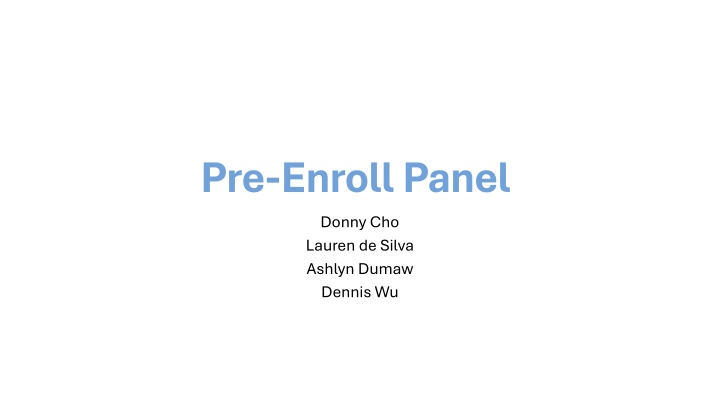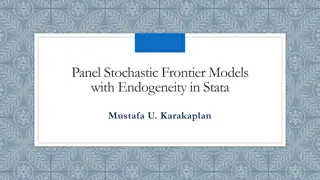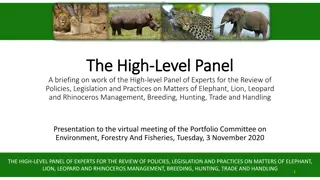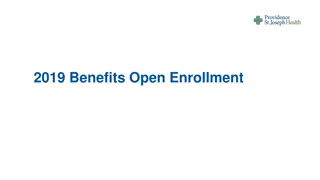
Bioengineering Course Reviews and Curriculum Insights
Explore detailed reviews and insights on bioengineering courses CHEME 2880 and CHEME 5430. Discover what these courses cover, how they are structured, and students' opinions. Find out which bio elective to choose and gain valuable information to make informed decisions about your academic pathway in bioengineering.
Download Presentation

Please find below an Image/Link to download the presentation.
The content on the website is provided AS IS for your information and personal use only. It may not be sold, licensed, or shared on other websites without obtaining consent from the author. If you encounter any issues during the download, it is possible that the publisher has removed the file from their server.
You are allowed to download the files provided on this website for personal or commercial use, subject to the condition that they are used lawfully. All files are the property of their respective owners.
The content on the website is provided AS IS for your information and personal use only. It may not be sold, licensed, or shared on other websites without obtaining consent from the author.
E N D
Presentation Transcript
Pre-Enroll Panel Donny Cho Lauren de Silva Ashlyn Dumaw Dennis Wu
Typical Sophomore Spring Courseload Linear Algebra for Engineers (MATH 2940) OR Eng Probability and Statistics: Modeling and Data Science (ENGRD 2700) OR Uncertainty Analysis in Engineering (CEE 3040) in sem 7 Introduction Physical Chemistry Laboratory (CHEM 2900) Physical Chemistry II for Engineers (CHEME 2200) Fluid Mechanics (CHEME 3230) Liberal studies Major-approved bio elective
Choosing Your Bio Elective COMPARING Biomolecular Engineering: Fundamentals and Applications (CHEME 2880) Bioprocess Engineering (CHEME 5430) General Microbiology Lectures (BIOMI 2900) Principles of Biochemistry, Individualized Instruction (BIOMG 3300)
CHEME 2880 What s covered in the course: What s covered in the course: 10% of course is pure bio. Only the foundational bio you need to understand the rest of the course. Proteins, Lipids, DNA, Carbohydrates, Central Dogma Bioreactors (reactor design reactor design) Models for Gene regulatory circuits (controls controls) Biomolecular interactions (equilibrium models, kinetics kinetics of binding) Enzyme Kinetics (Michaelis Menten) Last 10-15% of the course is all about how bioprocess is applied in industry (drug development, patenting, product commercialization) Structure of class: Structure of class: X1 short-ish MC quiz on basic bio knowledge X10 in class 5 question MC quizzes about previous weeks content X2 in class prelims X1 final group presentation on some biotech development, topics are assigned X1 final group project. Our year it was a single-page stock pitch for a new biotech startup X2-3 Lab s sessions throughout the semester + final lab report (~10 pages). 1st lab was for gene writing/sequencing, 2nd lab was growing a protein in a bioreactor, 3rd lab was separations and extracting your product Opinions: Opinions: Overall an interesting and engaging class even though I am not really interested in bio Good for people with no-prior bio knowledge (I went in only having freshman HS bio knowledge) Focuses on breadth of topics, not depth. Incorporated all core ChemE topics but in a Bio lens Not terribly time-consuming. PSETs are not terrible if you go to Office hours. Paszek makes himself very available for help with PSETs. Exams were pretty fair
CHEME 5430 What s covered in the course: What s covered in the course: Biomolecular Considerations (DeLisa, more understanding/conceptual): ~10% of course is pure bio. Basic bio concepts taught semi-quickly in lecture + expectation is you supplement it with reading in textbook. Drug Development process Recombinant DNA + Protein Engineering (big focus) Enzyme Kinetics Genetic Flow Cellular Considerations (Delisa/Woltornist, more mathematical modeling): Cell Growth Kinetics Bioreactor Design + Scale-Up Industry Rep/Guest Lectures (Merck, GSK, Regeneron, Apertura, US FDA) Good for networking!!! Downstream Considerations (Woltornist, shorter topic): Structure of class: Structure of class: X1 semester-long team project x3.5 written reports/deliverables (+ optional report) X5 problem sets (last was made optional for my semester) X1 cumulative final exam Opinions: Opinions: recommendedclass if into pharma industry! Interesting + semi-engaging class (I'm not a big bio person) BUT Good overview of components of a pharma company. Decent for people with no-prior bio knowledge, will require a bit of bio catch-up (only freshman HS bio knowledge). Breadth + some depth of topics. Not very time-consuming. PSETs are not bad if you start early. Take class with people you work well with (?) b/c team project
BIOMI 2900 What s covered in the course: What s covered in the course: Microscopy techniques Basic cell structure of prokaryotes (cell walls, motility, etc), their growth, and cell signaling (heat shock response, nutrient starvation, etc) Gene expression (translation, transcription) and DNA repair and mutation Molecular bio and biotechnology Basic overview of metabolism: glycolysis, electron transportchain, photosynthesis, nitrogen and carbon cycles Basic immunology, how vaccines work, and immunity Infection mechanisms of pathogens (attachment,replication, etc) and food/water borne diseases Virology: Genetic and cell structure of different virus types, and their 'growth' cycle Structure of class: Structure of class: X38 pre-lecture short canvas quiz homeworks, takes <10min and you get a couple retakes X6 quizzes covering ~5 lectures each, 1 is dropped X3 prelims (final focuses on last 1/3 of class, plus some very general questions about the first 2/3) (might be different in the future) Opinions: Opinions: I liked the class because it covers a lot of different topics, and it wasn't stressful because it wasn't very in depth o Ex: For glycolysis you only need to know sugar is broken down and how many ATP are made, vs. BIOMG you need to know all the chemical structures, reactions and regulation Cool because other bio electives don't really cover pathogenesis and viruses, interesting info if you want to work with vaccines/pharma Readings are not necessary to do Discussion section is not necessary (you can take the class for 3 credits without a discussion or 4 credits with a discussion) If you have a good memory, this class is very very easy, and you don't have to think about it until prelims If you have zero interest in biology and want to get your elective over with, this is a good class to take to get a foundation without much effort Most of the class is pre-med bio majors
BIOMG 3300 What s covered in the course: What s covered in the course: The course is split into 3 modules: Protein structure and function, Molecular biology (DNA/RNA), and Metabolism The Proteins section covers the structure of amino acids, protein folding, enzyme regulation, enzymes kinetics, and membranes The Molecular bio section covers gene expression (DNA/RNA), DNA repair, modification, sequencing techniques, recombinant DNA methods, and protein synthesis The Metabolism section covers glycolysis, gluconeogenesis,electron transport chain, glycogen synthesis/degradation, and fatty acid synthesis/degradation (with chemical structures) Structure of class: Structure of class: X13 units that are self-taught through readings, videos, and going to the study center for help. Must pass each before your deadlines X13 objectives for each unit with guiding questions and suggested readings X13 written quizzes with ~1 week to prepare for each (>80% is a pass, your actual quiz grade doesn't matter so a pass is logged as 100% for the unit) X13 multiple choice homeworks due before the day before their respective prelims (not weekly basis) X12 oral quizzes where TAs walk through the objectives X4 quiz retakes with 5% deductions after X14 one-day deadline extensions X3 non-cumulative prelims Opinions: Opinions: I think this was my favorite class I've taken at Cornell (made me rethink the industry I want to work in) Can be time consuming to learn, but is really rewarding, and help is always available through the TAs and the professor at the study center The actual quizzes aren't too challenging as long as you do the objectives You need really good time management skills, because no one will be reminding you to complete your quizzes unless you've already missed multiple deadlines If you're interested in pure bio but unable to take other classes, this course offers both breadth and depth. It's a really good foundation of biology and pre-req for advanced bio classes Doable even if you haven't taken bio classes (this was my first bio class since freshman year of HS, but I also took it alongside BIOMI 2900)





















